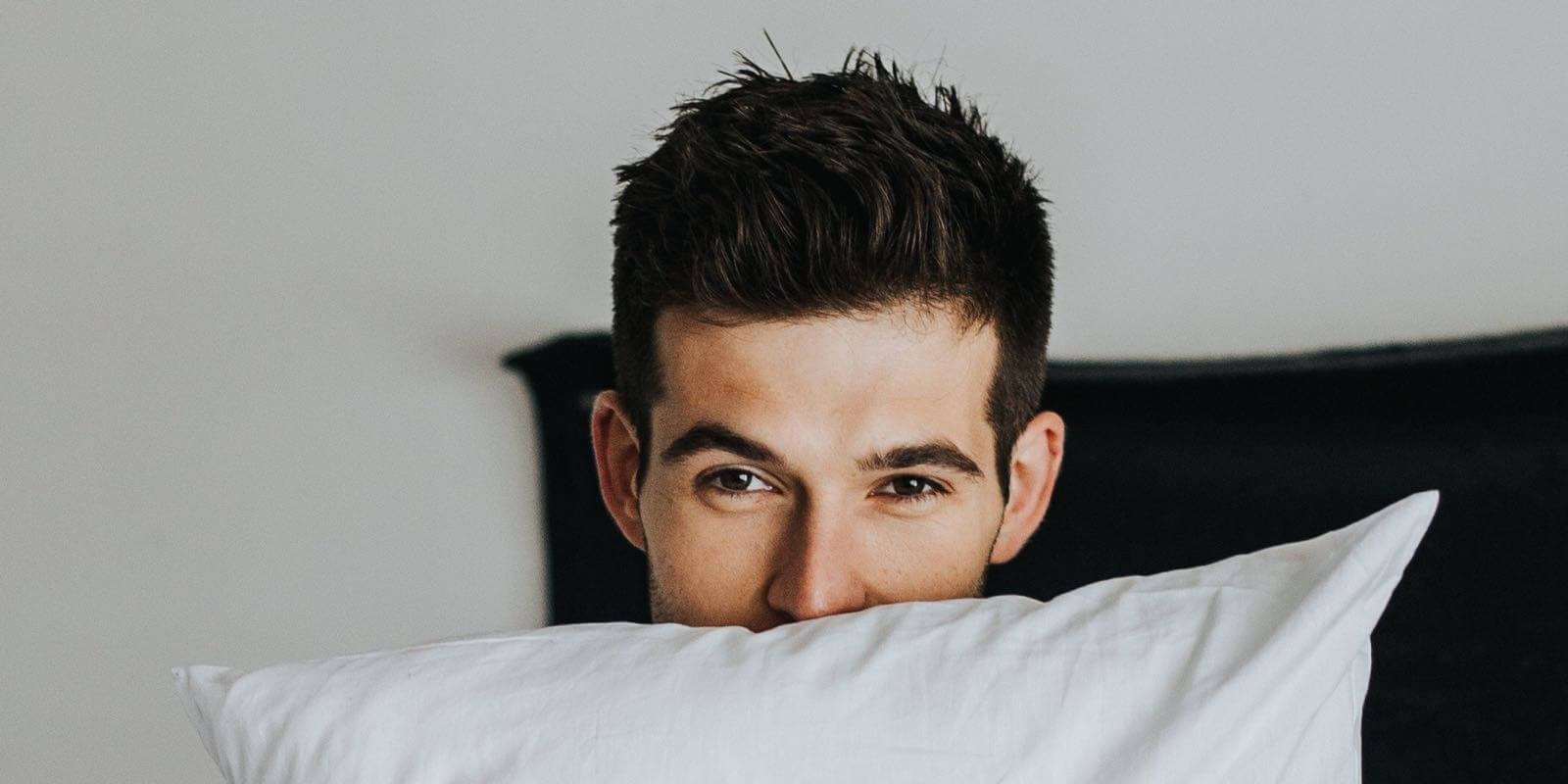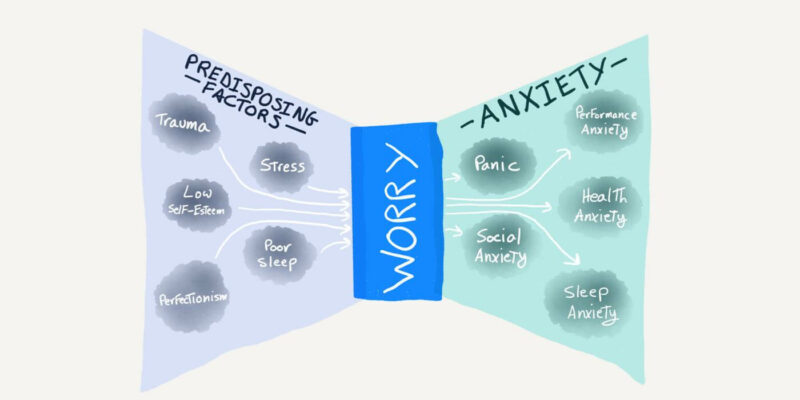It’s common to worry that we won’t sleep well before a big day and that our performance will suffer as a result. Think about giving a big presentation, interviewing for a new position, or taking some kind of exam or test.
In anticipation of a stressful work situation like this, many of us tend to worry about what will happen if we don’t sleep well:
- We worry that we’ll be physically tired: Low energy, poor stamina, sluggishness, lethargy, headaches…
- We worry that we won’t be mentally sharp: Poor focus, trouble coming up with the right word, forgetting crucial facts and details…
- We worry about being in a bad mood: Irritability, short-tempered, melancholic, anxious, stressed…
- And we worry that—for all these reasons—our performance will suffer.
When faced with concerns like this, many otherwise smart people make 2 critical mistakes when it comes to sleeping well before a big day:
- They try too hard to sleep. Known as the Sleep Effort Paradox, when we think a lot about sleep and exert lots of effort to fall asleep, we “rev up” our brains, paradoxically making it harder to fall asleep.
- They overestimate the negative consequences of poor sleep. While almost any amount of sleep loss will have some negative consequences, these effects are actually quite small (more on this below). But when we worry about our sleep, we teach our brains to fear sleep, which counterproductively, makes it harder to fall asleep.
In the rest of this article, we’ll look at 5 strategies for sleeping well before a big day that avoid the two problems of Sleep Effort (trying to sleep) and Sleep Anxiety (worrying about not sleeping).
You can use the links below to jump to a specific strategy:
- Increase your Sleep Drive with Sleep Restriction
- Boost your Sleep Drive with Exercise
- Build a Sleep Runway
- Schedule time for Deliberate Worry
- Sleep Myth Busting
1. Increase your Sleep Drive with Sleep Restriction.
Sleep restriction? Why would I restrict my sleep in order to get better sleep?!
Feeling good and performing well during the day are primarily a function of sleep quality rather than the overall quantity of hours slept.
Sleep Restriction is an established technique for improving sleep quality by harnessing the power of Sleep Drive.
Sleep Drive is the body’s natural need for sleep. We build up Sleep Drive over the course of the day, which means the longer we’re awake the stronger our need for sleep. Sleep Restriction takes advantage of this system and temporarily restricts the quantity of our sleep so that we’re awake longer and therefore build up more Sleep Drive. This results in better, higher quality sleep even if it’s at the expense of the sheer number of hours asleep.
For example, suppose you typically wake up at 6:00 am and fall asleep around 11:00 pm. That means that your body has 17 waking hours to build up Sleep Drive. But if you were to stay up one night until 11:30 pm and wake up at 5:00 am, you would then have 18.5 hours worth of Sleep Drive built up the next evening, which means you will be sleepier and more likely to sleep soundly throughout the night.
How to do it
In situations like this, I usually recommend cutting about an hour off your normal sleep time several nights before the big day.
For example, if you would like to increase your odds of sleeping well on Sunday night in anticipation of a big day on Monday, slightly restricting your sleep on Friday and Saturday night will improve your sleep quality.
If you normally wake up at 6:30 am, set your alarm for 5:30 am the couple days before so that you have an extra hour to build up more Sleep Drive.
You could also go to bed a half-hour later the night before and wake up a half-hour earlier the morning before. However, it’s generally better to adjust your wake up time rather than your go-to-bed time when doing Sleep Restriction since having a consistent, predictable evening routine is so important to good sleep overall.
2. Get an even stronger boost to your Sleep Drive by exercising.
While the sheer number of hours we’re awake during the day is the biggest factor in how much Sleep Drive we build up, physical activity—and especially exercise—leads to an even greater build-up of Sleep Drive. To understand how this works, we have to take a brief look at the chemistry of sleep.
When we say that Sleep Drive accumulates throughout the day and causes sleepiness when it is sufficiently high, what’s really going on in the brain is an accumulation of a hormone called Adenosine. If that term sounds vaguely familiar, it’s probably because you’re having flashbacks to high school biology lectures on energy production in the body.
The basic way that the body gets energy is through a process called Glycolysis, which turns the glucose that we receive from the food we eat into a usable form of energy for our muscles called Adenosine Triphosphate—ATP, for short.
The more energy we expend, the more ATP we produce and use. And as a byproduct of converting ATP into usable energy, regular old Adenosine gets leftover and starts to fill up all the Adenosine receptors in the brain. This is one of the mechanisms by which the body knows when to sleep: As we produce and use more energy, more and more adenosine builds up and our need for sleep increases.
The implication of all this is that we can increase our Sleep Drive even more than usual by expending extra energy throughout the day in the form of exercise or more rigorous physical activity. So, if you want to increase your odds of sleeping well the night before a big day, be as physically active as possible the days before.
ProTip: If you really want to maximize the sleep-enhancing effects of exercise, consider scheduling your exercise for the late afternoon or early evening. Immediately after exercise, our body’s core temperature spikes briefly but then drops slightly below baseline within three to six hours following the end of an exercise. This post-exercise drop in body temperature makes it easier to fall asleep.
3. Build a Sleep Runway
Many of us have a hard time falling asleep at night because it feels like our mind is still racing when we get into bed—going over to-dos for the next day, worrying about whether or not we’ll sleep well, trying to understand why we didn’t get that promotion we were expecting last quarter, etc.
In other words, many of us get into bed when our minds are still in work mode trying to solve problems. Interestingly, we expect that our minds should simply turn off as soon as our head hits the pillow. But the mind doesn’t work this way.
The mind is like a big 747 jet—an impressive piece of machinery that does some pretty amazing things and at high speeds. But just like a 747, the mind can’t go from 300 miles per hour at 30,000 feet to a full stop at the gate in the blink of an eye. It needs a nice long runway to gradually descend and slow down on before it gently pulls up to the gate and comes to a complete stop.
Similarly, the mind needs time to transition out of problem-solving work mode and into a state of relaxation before it can fall asleep. This is The Sleep Runway. It’s a relaxing period where you read a novel, watch Seinfeld re-runs, organize your stamp collection, or just sit in front of the fire with some tea listening to a favorite album or playlist. When our minds can gently and naturally relax and unwind, we are far more likely to fall asleep quickly and easily.
What (not) to do
One of the biggest mistakes I see people make with their sleep before a challenging day is to try and squeeze in extra work or preparation the night before. In the process, they ignore or compromise their otherwise sleep-promoting habits like a good Sleep Runway.
While tempting, the extra work we feverishly try to cram in at 11:30 pm is probably not worth the poor sleep that could come as a side effect.
If you’re feeling tempted to trade that Sleep Runway hour for a little more work time, it’s usually better to wake up early and do it then. Not only will it not interfere as much with your sleep, but you’ll probably do a better job at it on a decent night’s sleep rather than at the end of an already long and exhausting day.
4. Schedule time for Deliberate Worry.
Based on techniques from years of behavioral science, Deliberate Worry is the practice of intentionally scheduling a time to worry on purpose. The goal is to acknowledged and address worries and anxieties at an appropriate time and place with intentionality. This paradoxically lowers their intensity and makes it less likely that they will intrude on our consciousness at unexpected or inappropriate situations such as in bed before falling asleep.
The reason for this is that one of the primary functions of worry is memory enhancement. In other words, we worry so that we won’t forget. This means that if we have lots of outstanding or unaddressed anxieties or problems, without a good system in place for organizing, keeping track of, and taking action on them, our minds will keep playing them over and over so that we don’t forget.
By creating a consistent time and structure for worrying, we reduce the mind’s need to use worry as a memory aid. And if we’re worrying less—especially at night—we’re much more likely to fall asleep easily and sleep well.
How to schedule your worry
In the week or so leading up to your big day, pick a regular 15-minute window at a convenient time during your day and set it aside as your Deliberate Worry time.
Each day during this time, get out a sheet of paper and quickly write down everything you’re worried about that comes to mind. Try really hard to worry. List any and everything that might be worrying you, from the outcome of your big day to the bananas you forgot to pick up at the grocery store yesterday afternoon.
Importantly, don’t censor or get hung up on accuracy or details. This is like free-writing and should be relatively stream-of-consciousness.
After about 10 minutes of getting down your worries, circle or otherwise mark the 3 most pressing worries on the sheet. Then, in another column or a separate sheet of paper, write each of these worries down again followed by a next smallest action for each one.
A next smallest action simply means the next smallest meaningful step you could take to at least begin addressing the worry. For example, if you’re worried about whether you’ve forgotten something in your presentation for the following day, a next smallest action might be to set a reminder on your phone to review the contents of the presentation first thing tomorrow morning.
5. Sleep Myth Busting
The best thing you can do the night before a big day is not to worry or even think much about your sleep. Any kind of worrying, planning, problem-solving, or other goal-directed thinking about your sleep is likely to lead to arousal and therefore be counterproductive.
The key is to avoid arguing with your own anxieties or worries.
Let’s say you’re laying in bed and you start worrying about feeling groggy or out of it during your early morning meeting because you didn’t get enough sleep. The worst response to this would be to start criticizing yourself for “worrying about dumb things” or issuing commands to your own mind about how you need to “just stop thinking!” This just creates more arousal which directly inhibits sleepiness.
A better alternative is to gently remind yourself that things will probably be okay regardless of whether you get 8, 7, or even 5 hours of sleep. Then read a little bit or some other relaxing activity until you’re feeling less aroused and more sleepy.
But things won’t be okay if I only get 6 hours of sleep before the big presentation/match/trail/etc.!
Turns out, when you really dig into the research and data about the effects of even pretty significant sleep loss, they’re not nearly as terrifying as you might think or have heard online, especially in the short-term.
Here the two most common myths about the effects of poor sleep and some cold, hard data to bust them:
Poor Sleep Myth #1: If I don’t sleep well tonight, I won’t perform well tomorrow.
The negative effects of sleep loss on daytime performance are real but almost always overstated.
The most important distinction is between partial or moderate sleep loss and severe sleep deprivation. While it’s true that people who are limited to no sleep or only a few hours of sleep per night do display significant performance detriments, the effects of more modest sleep loss are surprisingly small.
Furthermore, there seems to be significant individual differences in the effects of moderate sleep loss on performance—in other words, not everyone is affected by sleep loss in the same way.
The most significant negative effects of short sleep duration on performance tend to be in tasks that are boring and monotonous—the exact opposite of the kind of situation and problems most of us are worried about during a “big day.”
Finally, there’s very little empirical research disentangling the effects of the stress and anxiety around sleep loss from the direct effects of sleep loss. In other words, when people appear to suffer from performance detriments after a poor night’s sleep, it’s very possible that their poor performance is more the result of their reaction to their sleep loss than the sleep loss itself.
A particularly insidious example of this is research showing that, while effective in helping people fall asleep initially, many of the most commonly prescribed sleeping pills can have negative hangover effects on performance the next day, often equal to or in excess of what you would experience from sleep loss on its own.
Unless you are consistently getting less than five hours of sleep per night on a regular basis, you likely have little reason to be concerned about poor performance due directly to sleep loss.
Poor Sleep Myth #2: My poor sleep is damaging my health.
Let’s get the big one out of the way right off the bat: Insomnia won’t kill you. Most people with insomnia aren’t actually sleep-deprived, they just have trouble falling asleep. In fact, on average people with insomnia don’t sleep that much less than those without insomnia.
But even looking at sleep duration independent of insomnia, the link between sleep duration and mortality is surprisingly weak.
Most of the best research on the relationship between sleep duration and mortality show that:
- The significance of sleep duration on increased mortality risk generally disappears or becomes almost insignificantly small when controlling for other health and lifestyle factors like smoking, drug and alcohol use, other medical problems, and physical inactivity.
- In aggregate, the evidence suggests that, if anything, a sleep duration of more than 8 hours puts people at a higher risk than those who get 6 or 7 hours per night.
Finally, there’s good evidence that most of the research on the relationship between sleep duration and health outcomes is severely flawed.
For example, almost none of the big research studies we hear about in the media suggesting a link between sleep duration and negative health outcomes use objective measures of sleep—they simply ask people for their own self-report of how much they tend to sleep. And self-report on sleep is notoriously inaccurate.
Wrapping Up
There’s nothing we can do directly to sleep well before a big day (drugs may knock you out but they all interfere with sleep quality). And in fact, the harder we try to sleep the more likely we are to remain awake and have a hard time falling asleep.
Instead, it’s important to put good habits and routines for our sleep in place ahead of time so that sleep comes naturally and effortlessly.
Temporary Sleep Restriction, regular exercise, maintaining a Sleep Runway, Deliberate Worry, and myth-busting poor sleep are five of the most effective and well-established techniques for doing just that.
The key is to get started on them well in advance of your big day.





10 Comments
Add YoursThe first point was an eye-opener for me. I should try that next time I want to sleep for a big day. Thanks, Nick!
You bet, Prakhar! Thanks for the comment!
The techniques are good. Recently i read https://www.independent.co.uk/life-style/fall-asleep-two-minutes-how-to-military-secret-trick-a8520991.html and found that also to be interesting.
But what i mostly took out of this was “Deliberate Worrying” this one works whether you are concerned about sleep or not. Thanks
Thanks, Naushad!
And I completely agree. As a psychologist who treats anxiety and insomnia, Deliberate Worry is probably the single best technique out there both for worrying less generally and falling asleep faster. ????
What about when it’s subconscious? It seems like often before a holiday or someone’s birthday, I have trouble sleeping or have very poor sleep. I just experienced this. I told myself not to worry about it, and consciously I was not worried at all. And I was even comfortable! But that worry must have been somewhere subconsciously. What do you do in these situations? I gave myself enough time to sleep and I wasn’t thinking about not getting enough – at least I wasn’t concerned over it. ( but part of my brain must have been). I used to suffer from very bad insomnia in the past for many years. But lately, over the past couple years I’ve been much much better and sleeping well except when it comes to an event the night before. What to do?
Hi Chris,
As far as I know, there’s no evidence that the mind worries “subconsciously”; by definition, worry is a conscious mental operation.
That being said, it’s possible that you’re engaging in more worry than you think you are. In which case, #4—scheduled worry—is the best solution I know of. Mindfulness meditation might also help bring more awareness to subtle worries or mental stress.
cheers, Nick
Thanks for sharing this it’s really helpful for me.
Thank you so much for sharing. It really helped.
I’m leaving a comment because this is one of the greatest sleep articles I’ve read. My man put in actual effort into making this and it shows. The biggest thing I worry about is health when it comes to not getting a lot of sleep, so the last bit really eased my mind. Great read, researched, and well written.
Thank you for this, very well written and directly relevant to my particular sleep problem. I am generally a good sleeper, falling asleep right away and sleeping through the night. The only sleep issues that arise for me are precisely the “big day” phenomenon. Whether it is a soccer match or a long drive, the cycle begins during the day with anxious thoughts about sleeping that night. I think the strategies above are interesting, particularly restricting sleep slightly leading up to a big day and the timing of exercise. I struggle with the mythbuster comment, because in my experience if I get less than 6 hours sleep, I actually won’t perform the same as I had slept 7 or 8 and I can feel the difference.